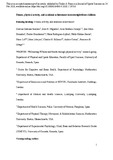Mostrar el registro sencillo del ítem
Fitness, physical activity and academic achievement in overweight/obese children
| dc.creator | Cadenas-Sánchez, Cristina | es_ES |
| dc.creator | Migueles, Jairo H. | es_ES |
| dc.creator | Esteban Cornejo, Irene | es_ES |
| dc.creator | Mora González, Jose | es_ES |
| dc.creator | Henriksson, Pontus | es_ES |
| dc.creator | Rodríguez Ayllon, María | es_ES |
| dc.creator | Molina García, Pablo | es_ES |
| dc.creator | Löf, M. | es_ES |
| dc.creator | Labayen Goñi, Idoia | es_ES |
| dc.creator | Hillman, Charles H. | es_ES |
| dc.creator | Catena, Andrés | es_ES |
| dc.creator | Ortega, Francisco B. | es_ES |
| dc.date.accessioned | 2020-07-09T09:51:37Z | |
| dc.date.available | 2021-02-24T00:00:12Z | |
| dc.date.issued | 2020 | |
| dc.identifier.issn | 0264-0414 | |
| dc.identifier.uri | https://hdl.handle.net/2454/37321 | |
| dc.description.abstract | The aim of this study was to examine the associations of fitness and physical activity with academic achievement in children with overweight/obesity. A total of 106 (10.0 ± 1.1y, 61 boys) children participated. The fitness components were assessed by field and laboratory-based tests. Physical activity was measured via accelerometry. The academic achievement was assessed by a standardised test and school-grades. Field-based cardiorespiratory fitness was associated with language skills (ß-standardised- ranging from 0.281 to 0.365, p < 0.01). The field-based muscular strength was associated with grade point average, natural and social sciences, and foreign language (ß = 0.280–0.326, all p ≤ 0.01). Speed-agility was associated with some language-related skills (ß = 0.325–0.393, all p ≤ 0.01). The laboratory-based muscular strength also showed an association with mathematics skills (ß = 0.251–0.306, all p ≤ 0.01). Physical activity did not show significant association with academic achievement (p > 0.01). Overall, the significant associations observed for muscular strength and speed/agility were attenuated and disappeared in many cases after additional adjustments for body mass index and cardiorespiratory fitness, indicating that these associations are inter-dependent. Our study contributes by indicating that other fitness components apart from cardiorespiratory fitness, such as muscular strength and speed-agility, are positively associated with academic achievement. However, these associations appear to be dependent on body mass index and cardiorespiratory fitness. | en |
| dc.description.sponsorship | This work was supported by the Fundación Alicia Koplowitz [-]; Spanish Ministry of Economy and Competitiveness [BES-2014-068829]; Spanish Ministry of Education, Culture and Sport [FPU15/02645]; Spanish Ministry of Education, Culture and Sport [FPU14/06837]; Strategic Research Area Health Care Science, Karolinska Institutet/Umea University [-]; Junta de Andalucia, Consejería de Conocimiento, Investigación y Universidades [-]; University of Granada, Plan Propio de Investigación 2016, Excellence actions: Units of Excellence, Unit of Excellence on Exercise and Health (UCEES) [-]; European Union's Horizon 2020 research and innovation programme [667302]; The SAMID III network, RETICS [PN I+D+I 2017-2021]; ISCIII- Sub-Directorate General for Research Assessment and Promotion, the European Regional Development Fund (ERDF) [RD16/0022]; EXERNET Research Network on Exercise and Health in Special Populations [DEP2005-00046/ACTI]; Spanish Ministry of Economy and Competitiveness and the Fondo Europeo de Desarrollo Regional [DEP2013-47540]; Spanish Ministry of Science, Innovation and Universities [FJC2018-037925-I]. | en |
| dc.format.extent | 40 p. | |
| dc.format.mimetype | application/pdf | en |
| dc.format.mimetype | application/zip | en |
| dc.language.iso | eng | en |
| dc.publisher | Taylor & Francis | en |
| dc.relation.ispartof | Journal of Sports Sciences, 2020, 38 (7), 731-740 | en |
| dc.subject | Aerobic fitness | en |
| dc.subject | Academic performance | en |
| dc.subject | Light physical activity | en |
| dc.subject | Moderate physical activity | en |
| dc.subject | Vigorous physical activity | en |
| dc.subject | Moderate-to-vigorous physical activity | en |
| dc.title | Fitness, physical activity and academic achievement in overweight/obese children | en |
| dc.type | info:eu-repo/semantics/article | en |
| dc.type | Artículo / Artikulua | es |
| dc.contributor.department | Ciencias de la Salud | es_ES |
| dc.contributor.department | Osasun Zientziak | eu |
| dc.rights.accessRights | info:eu-repo/semantics/openAccess | en |
| dc.rights.accessRights | Acceso abierto / Sarbide irekia | es |
| dc.embargo.terms | 2021-02-24 | |
| dc.identifier.doi | 10.1080/02640414.2020.1729516 | |
| dc.relation.projectID | info:eu-repo/grantAgreement/MINECO//DEP2013-47540-R/ES/ | en |
| dc.relation.projectID | info:eu-repo/grantAgreement/European Commission/Horizon 2020 Framework Programme/667302 | en |
| dc.relation.publisherversion | https://doi.org/10.1080/02640414.2020.1729516 | |
| dc.type.version | info:eu-repo/semantics/acceptedVersion | en |
| dc.type.version | Versión aceptada / Onetsi den bertsioa | es |





